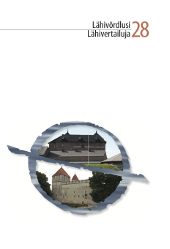Livvinkarjalaisen tekstin ymmärtäminen suomen pohjalta
Understanding Olonets Karelian text on the basis of Finnish
Author(s): Helka Riionheimo, Pirkko Muikku-WernerSubject(s): Finno-Ugrian studies, Translation Studies
Published by: Eesti Rakenduslingvistika Ühing (ERÜ)
Keywords: receptive multilingualism; cognate language; translating; similarity;
Summary/Abstract: Studies of receptive multilingualism (RM) in the Finno-Ugric language context have mainly dealt with Estonian and Finnish and their mutual comprehension. The comprehension between Finnish and Karelian has been studied very rarely but Alekseeva (2016) shows that even North Karelian, the variety closest to Finnish, is not always easy to comprehend for Finns. This article examines how Finns translate into Finnish a text written in Olonets Karelian. Finnish and Olonets Karelian share a lot of vocabulary and morphosyntactic features but Olonets Karelian also has words that do not have a counterpart (often of Russian or Veps origin). In the test, first year students of Finnish linguistics were asked to translate a news text into Finnish. Furthermore, in order to shed light on the problematic areas of translation, an applied version of think-aloud protocol was used: the students were asked to write and describe their translation process and the way they arrived at a particular translation equivalent. The strategies used in translation were similar to what has been shown in earlier RM research on Finno-Ugric languages. Comprehension is most facilitated by the similarity between cognate words, and the similarities in infection, derivation, compounding and syntactic structures also help in inferring the content of the text. In addition, comprehension is supported by the ability to utilize general world knowledge, context, metalinguistic knowledge and knowledge of the variation of Finnish.
Journal: Lähivőrdlusi. Lähivertailuja
- Issue Year: 2018
- Issue No: 28
- Page Range: 285-315
- Page Count: 31
- Language: Finnish

